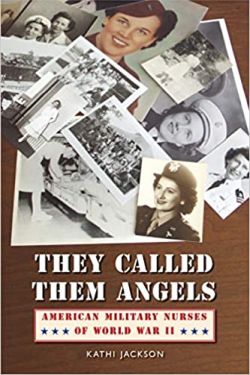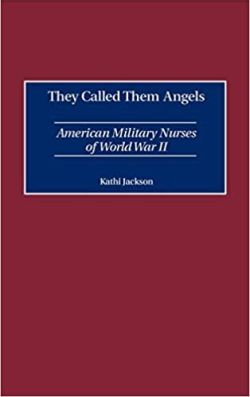They Called Them Angels:
American Military Nurses of World War II

A topical presentation of firsthand accounts from some of the thousands of army and navy nurses who served both stateside and overseas during World War II, this book tells the stories of the brave women who used any and all resources to save as many lives as possible.
Although American women were never forced to participate in World War II, thousands volunteered. Among those were 77,000 nurses -- women who risked their own lives to provide aid and comfort to the GIs so far from home.
These women loved their patients and their hearts ached when they couldn't save a life or relieve suffering. Their hearts ache even today. A good example is Retired Brigadier General Lillian Dunlap, an intimidating woman who cried each time she told the following story.
One morning I went on duty and was getting the change of shift report at the nursing station. One of the patients from my wing came to me and said another patient wanted to see me.... The patient who wanted to see me was a great big strapping Marine who had his right arm amputated and both legs amputated. He had had a brain injury too and, as a result, hadn't been able to speak although he was alert.... When I walked down... he looked at me and said, "Hi, Tex." The patients were just so excited about it because it was the first thing he had said -- "Hi, Tex." Now, how can you ever forget anything like [that]?
No matter how sad the case or bad the wound, the nurse always knew that her job was to make the man feel better, even if her own heart was breaking. Alice Lofgren learned this the hard way.
One young sailor was so small. He said he was just under 18, but he didn't look more than 16. His ship sunk, a tanker I think, and there was flaming oil everywhere. He was a mass of scars, and some of his fingers were burned off. Most of his body was burned. He was the most pathetic thing you ever saw, but it didn't make me sick because I knew I could talk to him and the other patients would crack jokes with him.
Although Ruth Shadewaldt arrived in New Guinea when the fighting was over and treated few battle casualties, she still had plenty of patients. One poor man had been burned by electrical wires. "I took care of him and knew he was dying," she said. "We talked and talked and I [wrote] to his mother. That was really sad because he was in so much pain. He was burned all over -- his head, face, hair."
Abbie Ratledge's patients included men with malaria, schistosomiasis, hepatitis, pneumonia, diphtheria, gonorrhea, syphilis, and galloping tuberculosis, but the saddest were the patients who never left their ward -- "the men with no faces."
Some had their nose blown off; some had no jaw; some were sans chin, nose and jaw; and a few had only a forehead left. I went through this ward and stood in amazement and perfect wonder how these valiant nurses dealt with the problem of feeding these cases. Most of them were tube fed, and hours were spent getting nourishment into them. Some were so horribly disfigured they were in a private area from the others. I gnashed my teeth at war. These are the living dead, who will spend the rest of their lives in a closed section of some Stateside hospital. The fatal bullet was more merciful.
Grace Newton told a magazine reporter, "I can't ever forget one young soldier whose bravery collapsed in a last desperate cry as the medical officer walked away, unable to... save him. "Nurse, don't let me die." Kneeling beside his cot, I could only hold him as he died. What little we had to offer! Sometimes only a prayer that God would grant a quick death.
When a nurse in the Pacific heard planes leaving a nearby base, she prayed, "Dear God, please bring those boys back to us alive and well. But if they are hurt, give us strength, courage, and wisdom to be ready to help them." And when the men did arrive needing help, she said, "it made me feel mighty proud to do my little bit in helping to take care of them."
"Nothing gave our nurses a keener sense of accomplishment," wrote Alice Goudreau, "than to be able to bid Godspeed to a paralyzed marine who was leaving the hospital after several weeks of care, with his wounds healing and the rest of his skin intact."

Besides medical care, nurses tried their best to provide what they called "special nursing" -- doing those little things that made big differences: giving a backrub, reading a letter, playing a game, or just listening. But they did what they could as often as they could. During holidays, for example, they found ways to decorate the wards with makeshift Christmas trees and fake snow and stockings filled with any treats they could find. At Easter they colored eggs. In the freezing temperatures of the Aleutian Islands, they make hot cocoa.
No matter where they went or what they did, there were thousands of men who would forever acknowledge how much these women had helped them. One army private wrote, "She taught him that he was still a soldier, still fighting a battle, still with an idea that must be maintained. Yes, she taught him to banish the clouds of eternal inner suffering, self-pity, and self-consciousness. Instead, she helped him find the cheerful, warm, radiant sunlight of self-assurance which will remain with him until he has ridden in his last jeep."
A general is quoted as saying about the nurses, "I've seen them work in Africa, Sicily, and Normandy. I say in all sincerity that no one has done more for the American soldier than the nurses in our hospitals." A surgeon at a clearing hospital said, "The patients make faster progress when a nurse looks after them. She's an American woman who represents home, mother, wife, and sister to the wounded soldier. Just the sound of her voice is sometimes as good as medicine."
But if you ask the women, chances are good that they will tell you that their most important legacy is the number of daughters and sons who were born and raised by men who survived the war because of the nurse who kept them alive. Lillian Dunlap said, "The nursing care that we were able to do under those conditions I consider quality care. By today's standards it might not be because we didn't have all of the fancy equipment, but our patients survived and that's what it was all about."
About the Book
These stories were published in They Called Them Angels: American Military Nurses of World War II, by Kathi Jackson, originally published in hard cover by Praeger, an imprint of Greenwood Publishing Group, Inc., Westport, CT. Copyright © 2000 by Kathi Jackson. Reproduced by permission of Greenwood Publishing Group, Inc. All rights reserved. No part of this book may be reproduced or transmitted in any form or by any means electronic or mechanical including photocopying, reprinting, or on any information storage or retrieval system, without permission in writing from Greenwood Publishing Group.
About the Author
Kathi Jackson has also written Steven Spielberg, A Biography, Greenwood Press, 2007. She writes nonfiction, fiction, and children's books.
About Angels in Medicine
Angels in Medicine is a volunteer site dedicated to the humanitarians, heroes, angels, and bodhisattvas of medicine. The site features physicians, nurses, physician assistants and other healthcare workers and volunteers who reach people without the resources or opportunities for quality care, such as teens, the poor, the incarcerated, the elderly, or those living in poor or war-torn regions. Read their stories at www.medangel.org.